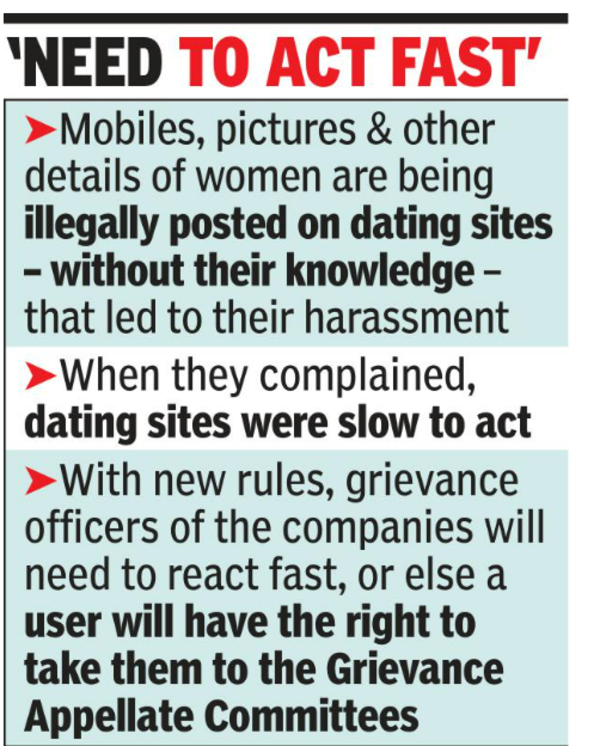For example, there have been instances where fake IDs of women – posted on dating and matrimonial sites – were not removed despite pleas by the aggrieved persons. “There have been cases where phone numbers, pictures and other details of women were illegally posted on dating sites – without their knowledge – that led to their harassment. And when they complained, the dating sites and matrimonial platforms were slow to react, or didn’t respond at all. With the new rules, the grievance officers of the companies will need to react fast, or else a user will have the right to take them to the Grievance Appellate Committees (GAC) for redressal,” a source in the government told TOI.
The source said while the discussions so far have focused on companies such as Facebook, Twitter, Instagram and YouTube and social media messaging, the amended rules have a wider ambit as it covers dating, matrimonial, ecommerce and online classifieds where users have a big play, but not an effective redressal mechanism to their complaints.

“If the consumer wins a reprieve from the GAC, the companies will have to abide by the decision or else approach the high court. Even in the courts, a favourable decision of the GAC will carry more weight and the company – which is refusing to take action – can even be ordered to be blocked. Thus, people will get empowered.”
Giving further examples, the source said that there have been cases where illegal products are being sold on e-commerce platforms, such as slippers that have the country’s flag drawn on them or depicting deities, cigarette ashtrays in the shape of a woman’s private parts. “Some of them may seemingly not be illegal, but rather unethical. A citizen, or a user of the platform, may now ask the company’s grievance officer to take off the product immediately, failing which he can approach the GAC.”
There have also been cases when online classified companies, many of whom even provide details about massage parlours, have given out details of a woman illegally. “Someone may illegally post the numbers of a woman without her knowledge. What does she do if the grievance officer refuses to listen to her complaints. Now, she has the option to approach the GAC.”
The government has also emphasised that it may go beyond the GACs – and bring in penalties – if the case companies still do not yield effectively to genuine consumer complaints. Minister of state for IT and lectronics Rajeev Chandrasekhar said that penalties may be stipulated in case the government is not satisfied with the response. “The option always remains open. But we will first analyse how the companies respond to the new Rules,” he told TOI.
The minister said that the government gets “consumer complaints in lakhs” where users say that their pleas remain unheeded by the grievance officers of companies. “In good faith, we always hoped that the intermediaries (consumer platforms) will understand and take note of the grievances of the users, instead of engaging in just tokenism. However, as there was not much headway, we decided to proceed with the concept of having GACs.”
The minister said that the amendments put obligations on internet companies to ensure that no unlawful content or misinformation is posted on their platforms. “The obligations of intermediaries earlier was limited to notifying users of the rules. But now, there will be much more definite obligations on the platforms. Intermediaries will have to make efforts to ensure that no unlawful content is posted on the platforms”.






